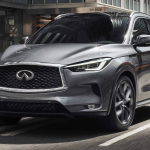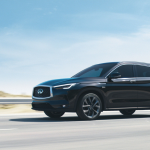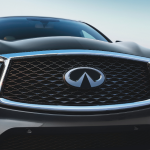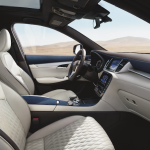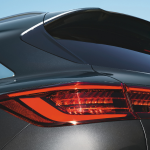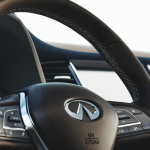Auto Reviews
Infiniti QX50 Review: When Value Meets Cutting-Edge Technology

Spec it in any way you want, but the second-generation Infiniti QX50 makes a strong comeback as it steps into the big leagues with a galore of technology that extends to its smart powertrain, and is enough to warrant a look if you’re in the market for a luxury crossover. BLME’s Alvin Thomas writes…
With an image that can be construed as obscure, the Infiniti QX50 powers its way into a comprehensive Infiniti lineup that is chockful of legacy and heritage. But with technologies that can be measured as groundbreaking, the crossover SUV snags a standalone spot in an otherwise long list of vehicles in the segment.

Only half a decade separates the two-generation-strong lineage of the QX50 – but the vogueish crossover SUV tries hard to hark back to its roots as a value offering as it sits rather anxiously between the family-centric QX60, and the sporty and youthful QX50.
In auto terms, that puts the QX50 in a virtual blind spot among other Infinitis. But as we learn over the course of our drive, its obscure positioning quickly makes sense as its quirks and features begin unfurling.
Albeit, we’re getting ahead of ourselves.
Exterior Design

Beginning with the basics: the Infiniti QX50 marries the best of the brand’s signature design-language with a dollop of its unique cues. So, the headlamps are reminiscent of the QX30 but they’re a dash wider and have larger daytime-running lights. The double-arch grille is still striking when compared with other Asian rivals, while the cuts and chisels on the curvy bumper give the vehicle a distinctive fascia.
The side profile, aside from its obvious length, benefits from bold character lines running across the vehicle and strong chrome elements on the window sills that add a touch of class to the overall package.

Rounding off the package is the clean posterior. The C-pillar recedes over the wide haunches that house the respectable 235/55-section all-weather run-flats wrapped around 19-inch alloy wheels. Meanwhile, the tail lamps, with its diffused red accents and the thick connecting chrome bar, set the tone to create what could be one of the more attractive vehicles in this ever-growing and lucrative segment.
Interior and Technology

As expected, Infiniti carries over its new-generation interior to the QX50, too. The interface is sleek, chic, and poses immense functionality over its plebian predecessor. Leather, suede, and soft-touch materials aplenty, the interior – from the headliner to the dashboard and even the door panels – are laden with high-quality materials save for plastic panels in lower sections of the cabin.
Our top-dog, fully-specced ‘Luxe Pro Assist’ variant also came ultra-premium ‘Bose Performance Series’ audio complete with brushed aluminium housing, ‘Cube Design’ LED headlamps, blind-spot monitoring, lane-keeping assist, pedestrian detection, forward emergency braking, and the usual safety nannies.
The electronic systems remained largely non-intrusive for most parts of our short drive, but we particularly enjoy the 16-speaker Bose sound system that reproduced crystal-clear audio and heavy base but without any jarring of interior panels.
Other tech toys include an adaptive cruise control system, 360-degree around-view monitor, eight-way power-adjustable seats, tri-zone adjustable a/c with rear vents, an interactive head-up display, a sizeable panoramic moonroof, and infotainment screens.
The latter system, which comes with eight- and seven-inch screens, are largely functional. The smaller screen takes up the top half of the dashboard and undertakes navigation and other entertainment functions; while the larger capacitive touchscreen is housed within a piano black panel and displays vehicular functions, and is tasked with controlling the top screen.
The system’s user interface is admirable, though the learning curve can be quite steep. Physical buttons accompany the high-definition screens and conduct tasks (on the said screens) alongside a high-quality and multi-functional rotary knob.
Seating position in the QX50 is flexible. The default position is SUV-tall, but those looking to sit low can slam the seats to the floor without any hindrance. The seats themselves are cushy and soft, but with just enough side bolstering to keep you locked in while you corner. On the other hand, lumbar support is excellent across all seats and should make for comfortable long-distance road trips.
Perhaps the word comfortable is an understatement of what the QX50 truly achieves. The low-NVH (noise-vibration-harshness) cabin builds on the strengths of the tech-heavy crossover. This is achieved with superior sound-deadening materials and thick insulations around the engine bay.
Powertrain

This is further enhanced by a highly-advanced 2.0-litre turbocharged in-line four-pot banger. The ‘VC-T’ motor uses a novel variable-compression turbocharged setup that can alter the compression ratios to provide superior levels of efficiency, and a surge of power and torque delivery when required.
The result is a 268hp engine that is also rated at 380Nms of twist. As expected from a turbo motor, torque kicks in early in the rev range (between 2,500 and 4,500), while maximum power is delivered at the 5,600rpm mark. Naught to 100kph is achieved in a respectable 6.9 seconds, which makes it quicker than all of its Asian rivals and only second to a handful of pricier and sportier Germans. Though, it must be noted that comparable European variants produce, on average, 10 per cent lesser power than the Infiniti.
Mated to a continuously-variable transmission (CVT), the VC-T engine responds to everyday situations with ease. Engine drone remains low even under hard acceleration, and the rubber band effect is non-existent (except for when it flirts around the midrange) thanks to the stepped “gear-shift” effect offered by the CVT. The drivetrain translated to impressive (and thrifty) economy figures of 12.8km/l during our short drive, while offering the thrust we’ve begun relating to more powerful naturally aspirated V6 motors from the parent company’s ‘VQ’ lineup.
Driving Dynamics

Ride comfort is sublime for a vehicle that rides on wide run-flat tyres, and wind and road noises are kept relatively low. We cannot verify if Bose has incorporated their noise-cancellation technology into the QX50 (like it does in select Nissans and other makes), but the NVH levels are among the lowest we have tested in recent times.
The QX50 keeps things sane on the handling front. Body roll is prevalent but manageable, and the safety systems remain active to prevent any inadvertent cornering that may translate to a potential rollover or nasty understeer. Grip levels are admirable, and the Common Module Family (CMF) chassis remains composed over bumps encountered at high speeds on the road.
This can also be attributed to the comfort-tuned suspension and clever steering rack. The latter, though relaxed in nature, is light in city traffic, and a tad heavier (though negligible), and responsive at high speeds. The brakes are strong, with a linear progression to stopping power that is generated by the four ventilated discs.
The Infiniti QX50 faces stiff competition from its European counterparts, but successfully maneuvers through them to pose a fitting argument in the battle for supremacy. Whether you feel obliged to acknowledge the smart technology that breathes life into what was an aging powertrain setup in the predecessor or not, robust performance and equally beguiling economy figures help this crossover make a strong case for those looking to dip their toes into Infiniti’s ever-increasing lineup of urban cruisers.
-

 Banking & Finance2 months ago
Banking & Finance2 months agoOman Oil Marketing Company Concludes Its Annual Health, Safety, Environment, and Quality Week, Reaffirming People and Safety as a Top Priority
-

 News2 months ago
News2 months agoJamal Ahmed Al Harthy Honoured as ‘Pioneer in Youth Empowerment through Education and Sport’ at CSR Summit & Awards 2025
-

 OER Magazines2 months ago
OER Magazines2 months agoOER, December 2025
-

 News2 months ago
News2 months agoAI Security Conference 2025 Hosted by Securado Highlights the Changing Cybersecurity Landscape
-

 Insurance1 month ago
Insurance1 month agoSupporting Community Wellness: Liva Insurance Sponsors Muscat Marathon 2026 with Free Health Checkups
-

 Interviews1 month ago
Interviews1 month agoEXCLUSIVE INTERVIEW: TLS Rebranding Marks Strategic Leap Toward Innovation, Sustainability & Growth
-

 Insurance3 weeks ago
Insurance3 weeks agoLiva Insurance Supports Community Wellness Through “Experience Oman – Muscat Marathon 2026”
-

 Banking & Finance4 weeks ago
Banking & Finance4 weeks agoA New Platform for SME Growth: Oman Arab Bank Unveils Tumouhi


